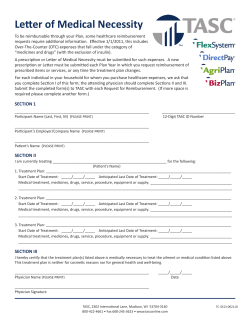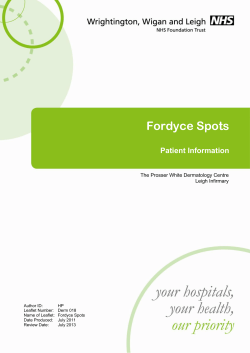
Biopsy/removal of polyp from the vocal cord this operation?
Biopsy/removal of polyp from the vocal cord What is a biopsy/removal of polyp from the vocal cord and why do I need this operation? This operation involves examining your throat under anaesthetic via the mouth and the removal of a small piece of tissue/polyp for analysis. What are the benefits of having a biopsy/removal of polyp from the vocal cord? The benefits of having a biopsy/removal of vocal cord polyp are that the results will help your doctor to make a definite diagnosis of your throat problem and plan any necessary treatment. What are the risks, consequences and alternatives associated with having a biopsy/removal of polyp? Most operations are straightforward; however as with any surgical procedure there is a small chance of side-effects or complications such as: • You may sustain bruising to your lips, tongue and soft palate due to the procedure. • Bruising to the vocal cords may result in noisy breathing and a change in your voice. • Infection may occur at the time of the procedure or shortly after. • Occasionally, a tooth may be chipped. If you are concerned about any of these risks, or have any further queries, please speak to your consultant. Alternatives Your consultant has recommended this procedure as being the best option. There are no alternative procedures available. However, there is always the option of not receiving any treatment at all. The consequences of not receiving any treatment are that your problem will persist and no diagnosis to your throat problem can be made. If you would like more information please speak to your consultant or one of the nurses caring for you. Getting ready for the operation You will be asked to attend the pre-operative assessment clinic. A nurse will discuss the operation with you. You may need to undergo some routine tests before your operation eg. heart trace (ECG), x-ray, blood test. You will be asked some routine questions about your general health, the medicines you take at the moment and any allergies you have. It would be helpful if you could bring your medicines with you, the nurse will need to know the name and strength. This includes any non-prescription medicines and any complimentary and herbal medicines. You will be asked not to have anything to eat, chew or smoke for at least 6 hours before your operation. You should have nothing to drink for 3 hours before surgery. You will be advised of the actual times. You will be asked to have a bath/shower before coming into hospital (if possible). Smoking cessation Smoking greatly increases the risk of complications during and after surgery, so the sooner you can stop the better. Even a few days before your operation can help to improve healing and recovery afterwards. For free help and advice contact the NHS Derby City Stop Smoking Service (Fresh Start) on Freephone 0800 7076870 or Derbyshire County Stop Smoking Service on Freephone 0800 085229. On admission When you arrive on the ward you will be introduced to the staff and shown to your bed. Your details (name, date of birth etc) will be checked on a number of occasions before the operation. This is normal practice and is for your safety. You will be given an operation gown and a wristband to wear. You will be asked to sign a consent form to say that you understand what you have come into hospital for and what the operation involves. You will be given the opportunity to walk to theatre or alternatively you may be taken on a trolley. What sort of anaesthetic will I have? Your operation will be carried out under general anaesthetic, which means you will be asleep throughout. The anaesthetist will visit you before your operation and discuss the anaesthetic with you. A small needle will be inserted into the back of your hand. What should I expect after the operation? When the operation is over, you will have your pulse, blood pressure, breathing and wounds checked regularly by a nurse. It is usual to feel drowsy for several hours. You will be given oxygen through a facemask until you are more awake. Anaesthetics can sometimes make people feel sick. The nurse may offer you an injection if the sick feeling does not go away, this will help to settle it. You will have a drip running into a vein in your arm/hand until you are eating and drinking again. You should rest your voice completely for the first 48 hours; no talking or whispering. It is advisable to bring a notepad and pen to use as a communication aid. Pain relief Following your operation your throat may be sore. A soft diet and plenty of non-alcoholic fluids is initially advised. If you experience pain it is important to tell the nurses who can give you painkillers to help. Mobilising You will be encouraged to get up and move around as soon as you are able. It is important to mobilise as soon as possible after an operation to reduce the risk of blood clots. Going home The operation will be performed as a day case or you may stay in overnight, this depends on your general health, the preferences of the surgeon and what time of day your procedure is performed. DISCHARGE INFORMATION AND AT HOME ADVICE Personal hygiene You may bathe/shower as normal. Pain relief It is usual to feel some pain after this operation. Take either the painkillers you were given from the hospital or a mild painkiller such as Paracetamol - follow the manufacturer’s instructions and do not exceed the stated dose. Time off work and returning to normal activities Following surgery there must be absolute voice rest for 48 hours and then gentle use of the voice for 1 - 2 weeks depending on your employment. If you use your voice a lot eg. teachers, telephonists, then 2 weeks would be enough. If your job involves minimum voice use then one week will be enough. You should avoid smoky and crowded areas and people with coughs and colds during your recovery period. Further information may be given to you on your discharge for the ward. Driving You must not drive for 48 hours. Your insurance company may refuse to meet a claim if they feel you have driven too soon. It is also advisable to contact your insurance company with regards to cover following a general anaesthetic. Further appointments An appointment will be made for you for approximately 6 weeks, however you may have an appointment in 3 - 4 weeks if a biopsy has been taken at the time of surgery and this earlier appointment will enable you to receive your results. If you are not given a date before you leave the hospital, it will be posted to you. If you have any problems please contact your GP. Important information for day case patients The anaesthetic drugs remain in your body for 24 hours and during this time are gradually excreted from the body. You are under the influence of drugs during this time and therefore there are certain things that you should and should not do. You should: • Ensure that a responsible adult stays at home with you for 24 hours. • Rest quietly at home for the rest of the day - go to bed or lie on the settee. • Drink plenty of fluids, but not too much tea or coffee. • Eat a light diet eg. soup or sandwiches. Avoid greasy or heavy food as this may cause you to feel sick. • Lie flat if you feel faint or dizzy. • Contact your GP if you have not passed urine 12 hours after your operation. • Have a lie in the next day. It could take 2 - 3 days before the weariness wears off and you could suffer lapses in concentration for up to a week. For at least 24 hours after your operation you must not: • Lock yourself in the bathroom or toilet or make yourself inaccessible to the person looking after you. • Operate any domestic appliances or machinery. • Drink alcohol. • Make any important decisions or sign any important documents. • Be responsible for looking after small children. • Watch too much television, read too much or use a computer as this can cause blurred vision. Useful contacts/reference For further information visit: www.entuk.org We hope your recovery is speedy and uneventful. If you have any queries please telephone Head and Neck Outpatients on 01332 787472, Monday to Friday, 9.00am - 5.00pm. After 5.00pm and at weekends contact Ward 307 on 01332 787307 NHS Direct is a 24 hour nurse led, confidential service providing general health care advice and information. Telephone 0845 4647 or visit the website at www.nhsdirect.nhs.uk Any external organisations and websites included here do not necessarily reflect the views of the Derby Hospitals NHS Foundation Trust, nor does their inclusion constitute a recommendation. Reference Code: P0586/1109/12.2009/VERSION4 © Copyright 2009 All rights reserved. No part of this publication may be reproduced in any form or by any means without prior permission in writing from the Patient Information Service, Derby Hospitals NHS Foundation Trust. (P0381/02.2009/V3)
© Copyright 2025





















